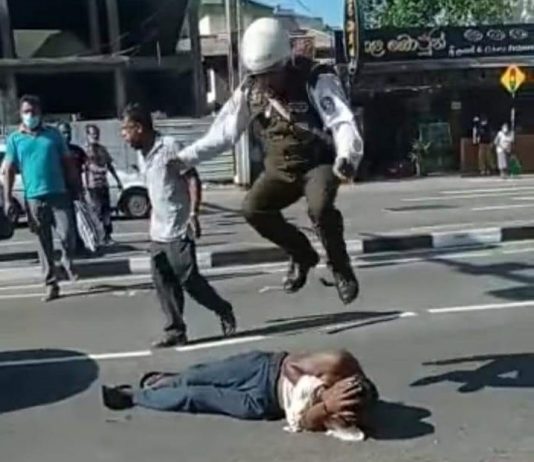Civilians have the right to self-defence in the event of an unprovoked attack from a police officer, police spokesman DIG Ajith Rohana said.
Speaking to the privately owned Swarnavahini this morning, Rohana said members of the public may resort to self-defence if their life is threatened by the actions of a uniformed police officer abusing his or her powers, as per sections 92 and 93 of the penal code.
The police spokesman, who is also an attorney-at-law, was commenting on the brutal assault on a lorry driver by a traffic police officer in Pannipitiya yesterday (29). Footage of the incident went viral on social media yesterday afternoon and the constable, who is attached to the Maharagama police station, was promptly arrested later in the evening amid public outcry about police brutality.
Investigations have revealed that the lorry driver in question had accidentally knocked down the Traffic OIC (officer in charge) of the Maharagama police at the Pannipitiya junction on the High Level Road. Footage showed the enraged constable, who was on duty at the junction, shoving the driver to the ground and leaping onto him, not unlike a professional wrestler. (Incidentally, the constable is a former athlete, according to Rohana).
Asked if civilians who find themselves in such situations can retaliate in order to defend themselves, Rohana said a civilian who is unarmed and not showing resistance can use provisions in the penal code to defend themselves in such a situation.
“The law is the same for everyone. It’s fair. And the civilian has the right to self defence in that situation,” he said.
Section 92 of the penal code reads:
There is no right of private defence against an act which does not reasonably cause the apprehension of death or of grievous hurt, if done, or attempted to be done, by a public servant acting in good faith under color of his office, though that act may not be strictly justifiable by law.
There is no right of private defence against an act which does not reasonably cause the apprehension of death or of grievous hurt, if done, or attempted to be done, by the direction of a public servant acting in good faith under colour of his office, though that direction may not be strictly justifiable by law.
There is no right of private defence in cases in which there is time to have recourse to the protection of the public authorities. Extent to which the right may be exercised.
The right of private defence in no case extends to the inflicting of more harm than it is necessary to inflict for the purpose of defence.
Explanation 1
A person is not deprived of the right of private defence against an act done, or attempted to be done by a public servant, as such, unless he knows, or has reason to believe, that the person doing the act is such public servant.
Explanation 2
A person is not deprived of the right of private defence against an act done, or attempted to be done, by the direction of a public servant, unless he knows, or has reason to believe, that the person doing the act is acting by such direction ; or unless such person states the authority under which he acts, or. if he has authority in writing, unless he produces such authority, if demanded.
Section 93:
The right of private offence of the body extends, under the restrictions mentioned in the last preceding section, to the voluntary causing of death or of any other harm to the assailant, if the offence which occasions the exercise of the right be of any of the descriptions hereinafter enumerated, namely –
Firstly- Such an assault as may reasonably cause the apprehension that death will otherwise be the consequence of such assault;
Secondly- Such an assault as may reasonably cause the apprehension that grievous hurt will otherwise be the consequence of such assault;
Thirdly- An assault with the intention of committing rape;
Fourthly- An assault with the intention of gratifying unnatural lust;
Fifthly- An assault with the intention of kidnapping or abducting;
Sixthly- An assault with the intention of wrongfully confining a person, under circumstances which may reasonably cause him to apprehend that he will be unable to have recourse to the public authorities for his release.


